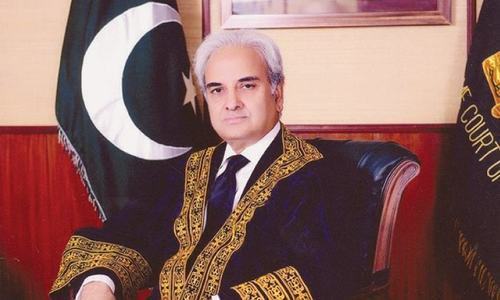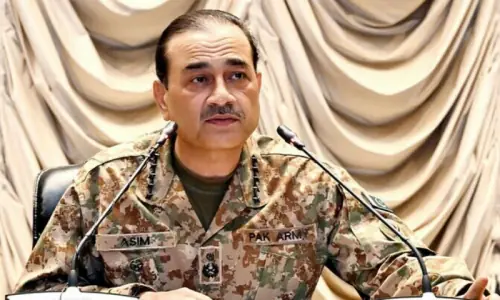Retired Justice Nasirul Mulk took oath as the seventh caretaker prime minister at a ceremony held at President House in Islamabad on Friday, hours after the National Assembly was formally dissolved in the lead up to the elections.
President Mamnoon Hussain administered the oath to Mulk, who was unanimously nominated for the post by both the government and opposition, with former PM Shahid Khaqan Abbasi describing the retired judge as a someone whom "no one could object to".
Read more: The caretaker government: Why do we have one and what purpose does it fulfil?
Top government officials and dignitaries attended the ceremony, including former PM Abbasi, the chiefs of staff, Senate Chairman Sadiq Sanjrani, and others.

Following the ceremony, PM Nasirul Mulk received a guard of honour at PM House.
The newly appointed caretaker PM, while speaking to journalists after the ceremony, said that members of the Cabinet would be announced after discussion on the matter, Geo News reported. He said he would like to keep the Cabinet small.
One of his first decisions was to change his principal secretary, Fawad Hasan Fawad, and replace him with Sohail Amir. Fawad has been rotated to DG Civil Services, DawnNewsTV reported.
Mulk also said he would make sure that the elections will be held in a timely and transparent manner. "We will fulfil the duty we were entrusted with," he promised.
The oath-taking ceremony was held hours after the third consecutive National Assembly completed its five-year constitutional term. It was only the second National Assembly to do so under civilian rule, with the 2002 assembly operating and disbanding under military dictator Gen Pervez Musharraf.
The three NAs elected seven prime ministers in 16 years, indicating underlying weaknesses in the process, the institutions of the state and political parties in the country.
Former PM Abbasi spent a busy last day in office yesterday attending the NA's farewell session, addressing a news conference highlighting his government’s achievements at his office and presiding over separate meetings of the Economic Coordination Committee and the Federal Cabinet.
During his address to the Assembly, Abbasi categorically stated that the PML-N would not tolerate even a day's delay in the elections. He also reiterated his party’s demand of formation of a Truth and Reconciliation Commission to investigate all major political incidents which took place in the country since 1947 to identify those responsible for them.
Editorial: Will the elections be held on time?
His demand received a positive response immediately from Opposition Leader Syed Khursheed Shah, who expressed the hope that whoever formed the next government must do it on a priority basis.
Nasirul Mulk: politically neutral?
Retired Justice Nasirul Mulk was born on August 17, 1950 in Mingora, Swat. He completed his degree of Bar-at-Law from Inner Temple London and was called to the Bar in 1977.
His father, Kamran Khan, was a businessman known for his philanthropic work in Swat. Mulk is fond of playing golf and is often seen taking a walk in the Margalla hills.
The now-retired Mulk practised as an Advocate in all fields of Law for more than 17 years until his elevation as a judge of the Peshawar High Court. He remained PHC chief justice for some time before his elevation as a judge of the Supreme Court.
When he took oath as the 22nd chief justice of Pakistan in 2014, members of the legal fraternity said the appointment would bring honour, dignity and quiet grace.
Why quiet grace? Because, they said, Justice Mulk seldom interjected court proceedings with questions to the counsel unless necessary. A judge who never lost his temper, he extended equal opportunity to the lawyers, but was firm about not allowing the contesting sides to get sidetracked by entering the political arena.
"He is a good administrator and a disciplined judge who knows how to manage courts," Advocate Hafiz S.A. Rehman commented at the time.
"He was a teacher who had complete command of his subject and avoided controversies," recalled a former student of Justice Mulk in the Khyber Law College of Peshawar University. "He always came into the classroom well prepared."
He has also delivered lecturers in Khyber Law College, Peshawar and Peshawar University besides delivering lectures as a guest speaker at the N.W.F.P. Provincial Services Academy, Peshawar.
He is remembered for the way he conducted a contempt case against then prime minister Yousuf Raza Gilani.
He convicted the then chief executive for 30 seconds while maintaining the dignity and honour of the court, and left the disqualification issue open to the Election Commission of Pakistan and the then speaker of the National Assembly, Dr Fehmida Mirza.
Explore: 30 seconds in custody
Justice Mulk is one of the seven judges who signed a restraining order on Nov 3, 2007, when retired Gen Pervez Musharraf imposed emergency and forcibly sent the judges home.
Justice Mulk later joined the judiciary on Sept 20, 2008, under the Naek formula when he took a fresh oath as a judge of the Supreme Court with his seniority intact.
Justice Mulk dissented from a majority judgement while deciding an appeal filed by Mukhtaran Mai for the enhancement of the sentence of her rapists and against their acquittal.
He partially accepted Mukhtaran Mai’s appeal by setting aside the high court’s verdict of the acquittal of the accused on April 21, 2011.
While hearing missing persons’ cases, Justice Mulk has always stood firm as a result of which a number of disappeared persons have surfaced.
Justice Mulk resigned from the post of the acting Chief Election Commissioner the day he was designated as the next chief justice.
He has also held the office of the chairman of the enrolment committee of the Pakistan Bar Council as well as the chairman of the building committee of the under-construction Supreme Court Bar Association (SCBA) complex being built at a staggering cost of Rs650 million.



































